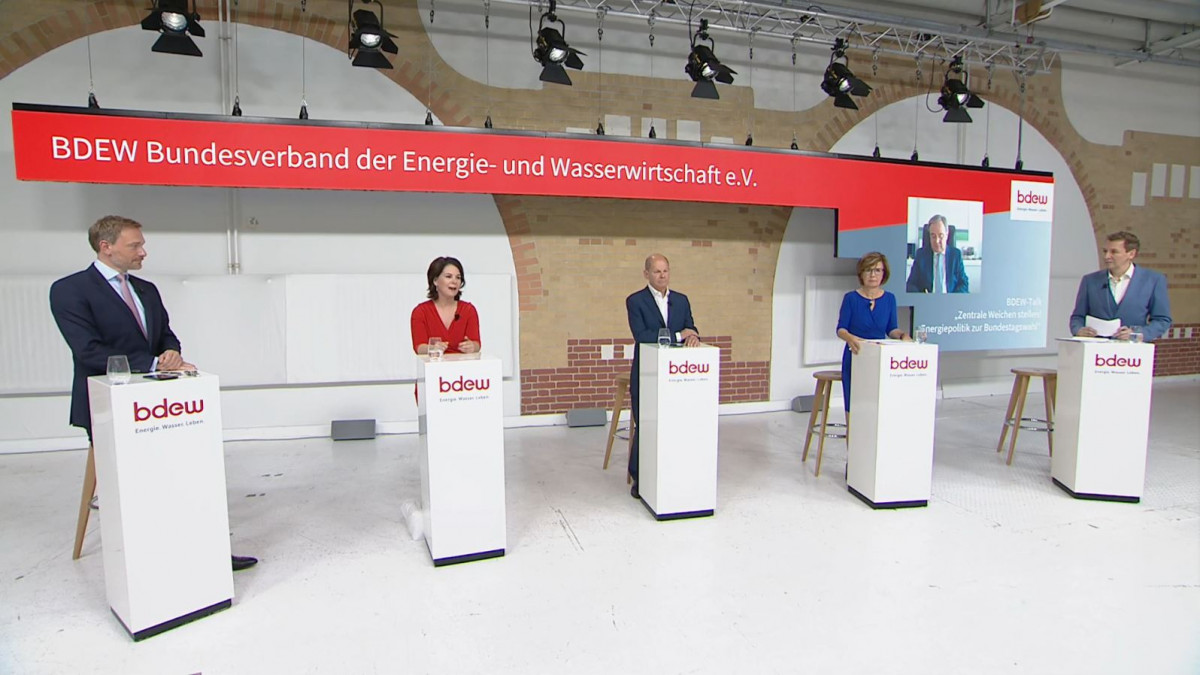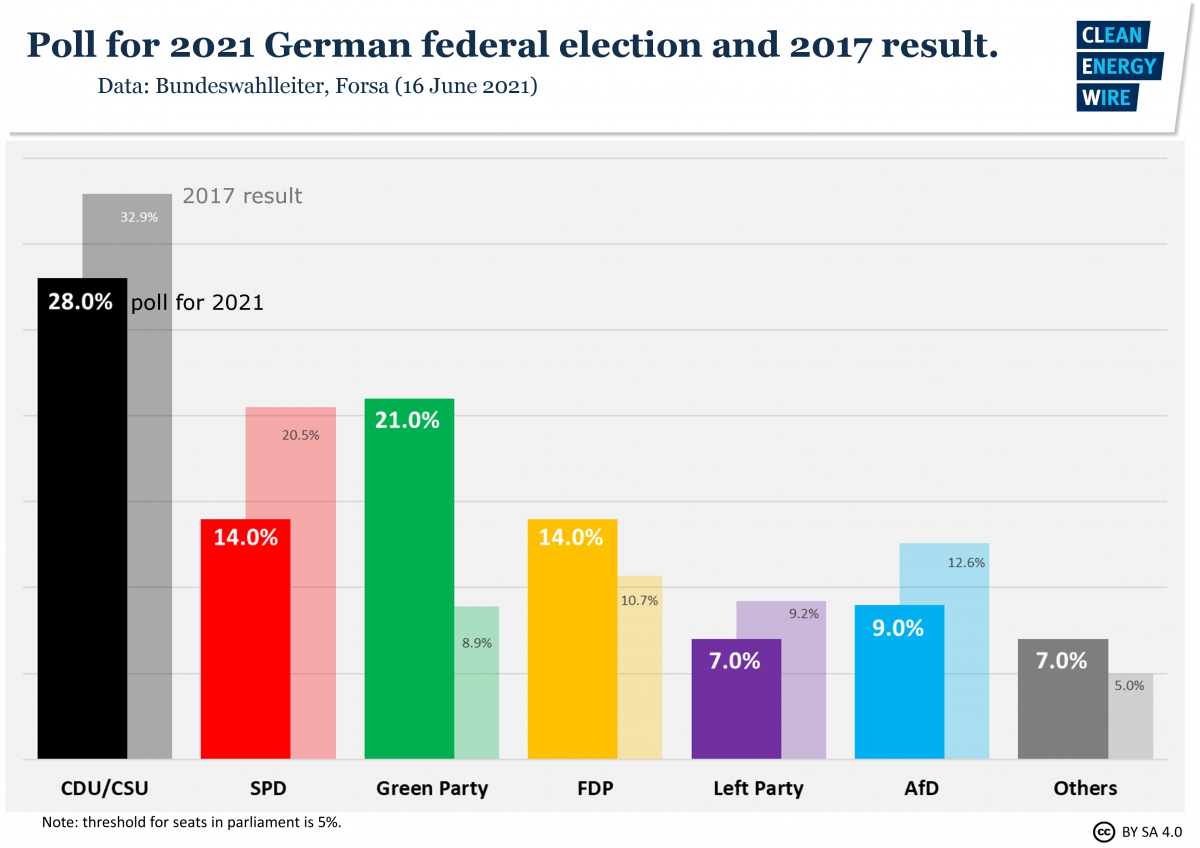Chancellor candidates agree Germany must cut red tape to speed up renewables roll-out
The candidates to succeed Angela Merkel in Germany's chancellery following the September elections faced off in a debate on climate and energy for the first time. The discussion organised by energy industry association BDEW showed few fundamental differences between the Greens’ Annalena Baerbock, conservative CDU/CSU candidate Armin Laschet, Social Democrat (SPD) Olaf Scholz and the lead candidate of the pro-business FDP, Christian Lindner. All candidates said it was necessary to speed up the renewables roll-out with more rapid approval procedures.
"The most important task for the new government right at the start of the next legislative period will be to increase renewables targets and enable faster approvals and grid extensions," said Scholz, only to be seconded by the other three. So solid is the agreement that Baerbock at one point said: “I wonder, if we apparently all agree, why we have such a problem with the expansion of renewables.” She had criticised the government parties for putting the brakes on renewables rollout in recent years.
Media commentators called the debate a “tame” affair. Climate and energy are too complicated issues to elicit bitter fights, wrote Michael Bauchmüller in Süddeutsche Zeitung. “When climate action becomes tangible, it also becomes complicated. Then the easy, catchy messages are quickly lost” and the candidates’ positions are very similar – “at least in words,” wrote Bauchmüller.
Still, some fault lines could be seen, such as on the role of natural gas. Again, all four politicians agreed that the fossil fuel will continue to play a role in the energy transition as a bridging technology. However, said Baerbock, “every bridge has an end.” The Green candidate reiterated her opposition to the controversial Russian-German Nord Stream 2 (NS2) pipeline project: "If we build a pipeline that is meant to be there in 40 years, then it won't be compatible with our climate targets.” Lindner called for the continued construction of Nord Stream 2, and conservative Laschet said that the pipeline “is designed so that it can also transport hydrogen.”
Green hydrogen made with renewable electricity is increasingly seen as a silver bullet for sectors with particularly stubborn emissions, such as heavy industry and aviation. However, it is not clear that NS2 would be able to transport pure hydrogen, or whether Russia would produce this with renewable electricity, or rather use its fossil gas.
German voters will head to the polls on 26 September to elect a new parliament, and thus decide who will follow the current government coalition to shape the country’s path to climate neutrality by mid-century. As climate policy has moved to the top of voters’ concerns over the recent two to three years, issues such as carbon pricing, renewables expansion and clean mobility are at the heart of the parties’ election programmes. The campaign gained full steam after the constitutional court ruled parts of the German Climate Action Law insufficient, causing government and opposition lawmakers to outbid each other on proposals. All major parties except the conservative CDU/CSU alliance have published at least a draft of their election manifesto.
The Green Party opted for a moderate climate policy path at a party conference on 11-13 June. Facing a recent dip in the polls, delegates followed a plea by party leadership and rejected calls for more radical and controversial steps to fight climate change. The CDU/CSU alliance of outgoing chancellor Angela Merkel has moved back into the top spot in the polls, providing candidate Armin Laschet with good chances to become the next German leader.
Key quotes from the BDEW event on 16 June:
Armin Laschet, CDU/CSU
"Any future government will face the question: How can we speed up planning and approval procedures?"
"It's correct that the acceleration of planning procedures must be the first project of a new government."
"I think Nord Stream 2 is necessary. There is no need to worry that it will transport natural gas in 40 years time, because it can also carry hydrogen."
"Hydrogen offers entirely new perspectives, and many companies already build projects that are hydrogen-ready."
"If we want to become a climate-neutral industrial country with industry jobs, a chemical industry, a car industry and so forth, then we won't achieve that with public relations brochures. It will be hard work in every single company."
Annalena Baerbock, Green Party
"It's a fact that the Grand Coalition [between Conservatives and SPD] slowed down windpower development with the cap on the roll-out in 2016. "
"We must lift the blockade on renewables so we can reach the climate targets."
"We need gas as a bridging technology, but every bridge has an end."
"Gas investments will also be worthwile under a Green government, because we have a clear condition: They must be hydrogen-ready."
"If we build a pipeline [Nord Stream 2] that is meant to be there in 40 years time, then it won't agree with our climate targets."
"We must take back the windpower distance rules and dedicate 2 percent of the country's surface area to renewable power generation."
"People aren't stupid, they know that things will have to change [on the way to climate neutrality]. We must not scare people off, but instead say: 'Together, we can manage this.'"
Olaf Scholz, SPD
"The largest challenge is that we need more electricity."
"Sectors like chemicals and steel will need an incredible amount of electricity [to decarbonise]."
"The most important task for the new government right at the start of the next legislative period will be to increase renewable targets and enable faster approvals and grid extensions. We need a speed that we haven't had before."
[The agreed rise of the CO2 price for transport and heating] "is a cautious path, and I think this is the right choice [...] When it comes to pricing, I'm in favour of a moderate path instead of making everything more expensive right away."
"It's undisputed that we will need natural gas, also for the flexibility of the grid."
Scholz called the EU green finance taxonomy “overrated” and said “it will be no problem to get the financing ready” for new gas turbines.
"The transformation of the industry is the biggest challenge we're facing."
Christian Lindner, FDP
"We need more renewable expansion."
"Above all, companies want faster approvals, not more subsidies."
"I believe the expansion of the gas infrastructure is important, and Nord Stream 2 should be completed. Natural gas is an important element on the way to climate neutrality."
"Hydrogen should not be the 'champagne' of the energy transition, but its mineral water."
"The energy and climate transition requires a transition in thinking, too. We need to overcome talk about abstinence and bans, and instead inspire people with a discussion about growth and progress."
"An all-electric society will bring fascinating economic possibilities."



